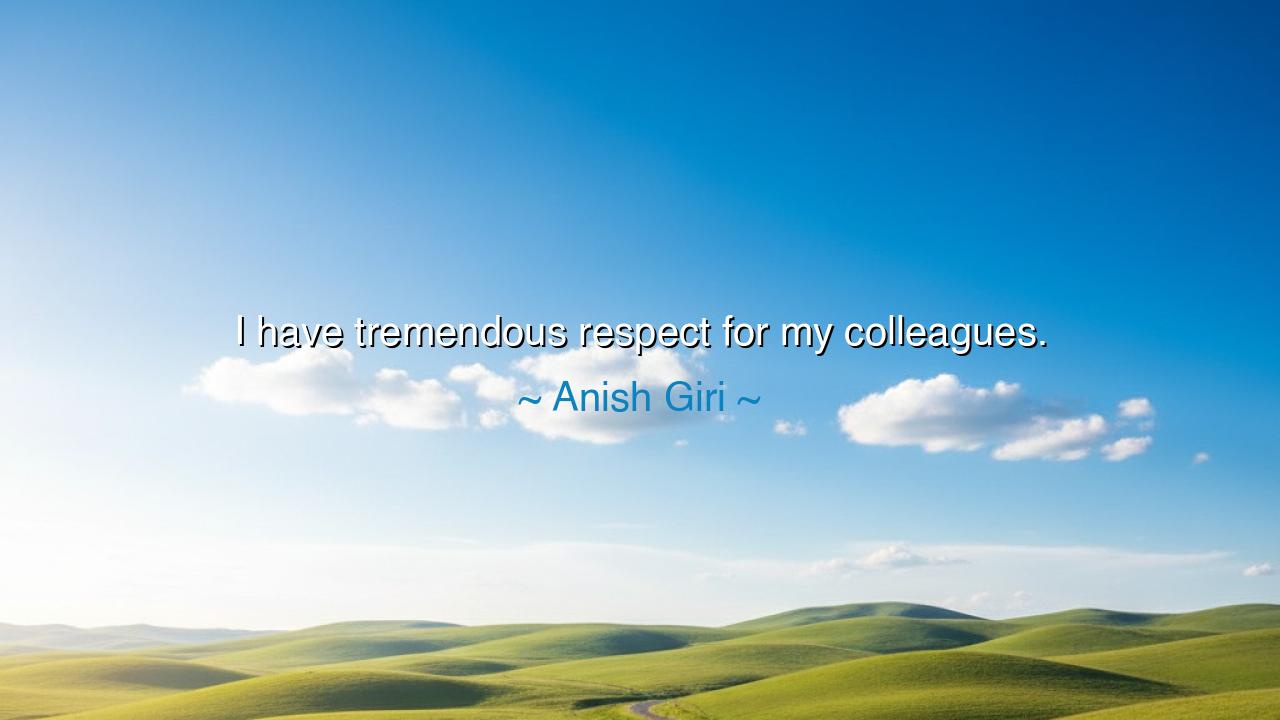
I have tremendous respect for my colleagues.






Hearken to the words of Anish Giri, whose reflection illuminates the virtue of mutual honor in the pursuit of excellence. He declares, “I have tremendous respect for my colleagues,” acknowledging that mastery is not attained in isolation, but in the crucible of shared endeavor. In this statement lies a timeless truth: the recognition of others’ skill, wisdom, and dedication not only elevates them, but cultivates one’s own growth, humility, and understanding. Respect is both a mirror and a lamp—it reflects the value of others and illuminates the path toward one’s own excellence.
Since antiquity, sages and warriors alike have recognized the power of honor among peers. In the academies of Athens, students were instructed to admire the intellect and diligence of fellow philosophers, understanding that progress arises from the exchange of insight and the acknowledgment of merit. Giri’s words echo this ancient ethos: the acknowledgment of colleagues’ skill is not mere politeness, but an essential practice of wisdom, fostering cooperation, competition, and mutual elevation.
Consider the story of José Raúl Capablanca, the Cuban chess prodigy, whose respect for his opponents shaped both his character and his play. By acknowledging the strength and creativity of his adversaries, Capablanca refined his own strategy and cultivated a deeper understanding of the game. Similarly, Giri, in expressing tremendous respect for his colleagues, recognizes that each interaction with fellow masters is an opportunity for learning, reflection, and refinement of one’s own abilities.
The cultivation of respect also serves to strengthen the community. Among warriors, scholars, and artisans of old, mutual recognition built networks of trust, collaboration, and healthy rivalry. Without respect, envy and discord would dominate; with it, each member of the community is inspired to greater effort, knowing that their peers’ honor and skill are both admired and a challenge to rise above. Giri’s statement reflects this truth: respect for colleagues fosters both personal and communal growth.
In the modern era, this principle retains its potency. In competitive fields, whether chess, medicine, or art, recognition of peers’ talents is foundational to ethical conduct, learning, and resilience. By valuing colleagues, one transforms rivalry into inspiration, and challenge into opportunity. The acknowledgment of excellence in others encourages continuous self-improvement while preserving harmony and dignity within the professional sphere.
A moral emerges: true mastery is inseparable from respect. To cultivate skill, insight, or wisdom is insufficient if one fails to recognize the contributions of those alongside us. Giri’s reflection teaches that humility and honor toward peers are not weaknesses, but strengths, allowing knowledge to flourish, networks to thrive, and one’s own potential to expand in the crucible of communal endeavor.
Practical guidance follows: observe the efforts and achievements of your peers attentively, speak honorably of their work, and seek opportunities to learn from their insight. By doing so, you not only enrich your own skill, but reinforce a culture of mutual admiration and ethical excellence. Respect becomes both a compass and a catalyst for personal and collective advancement.
Thus, heed the wisdom of Anish Giri: acknowledge the worth and mastery of those who walk beside you in pursuit of excellence. In cultivating tremendous respect for colleagues, one nurtures humility, insight, and enduring growth. Let admiration and honor guide your actions, for in lifting others, the spirit of mastery rises, and the path of excellence shines more brightly for all who follow.






AAdministratorAdministrator
Welcome, honored guests. Please leave a comment, we will respond soon